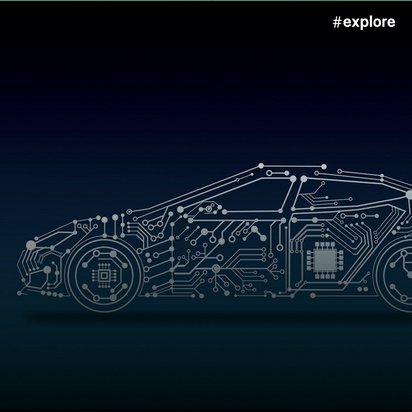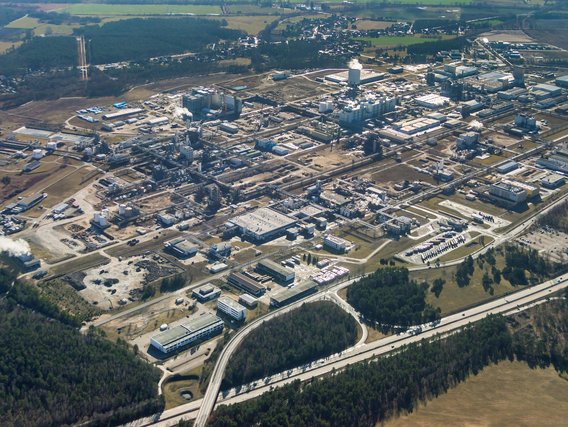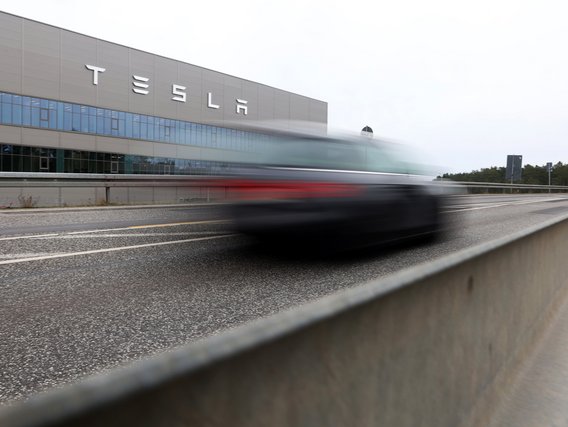Electromobility
Battery Cells in Germany: Who Builds Where?
The market for electric cars is growing – and so is battery production in Germany.

Electromobility
The market for electric cars is growing – and so is battery production in Germany.

20 April 2023
Battery cells are the heart of an electric car—both technically and economically. For years, the energy-dense cells primarily came from Asia. Politics and the automotive industry want to change that: Since 2020, battery cell projects in the EU have been subsidized. More and more battery factories are being announced, built, or are already in operation across Europe. Germany, in particular, aims to establish itself as a hub for battery production. Here’s an overview of what is being planned and built, by whom, and where.
At the end of January 2023, the Chinese battery manufacturer CATL started operations at its new factory in Erfurter Kreuz. This is the company’s first plant outside China and currently the largest of its kind in Western Europe. The factory initially employs 2,000 people and has an annual capacity of 14 gigawatt-hours. Both figures are expected to be reached at the beginning of next year. This capacity could supply around 270,000 small electric cars like the Renault Zoe or 130,000 long-range EVs like the Mercedes EQS. A gradual expansion to 24 gigawatt-hours is planned to supply not only Mercedes but also BMW. The Bavarian automaker holds a stake in CATL and has ordered battery cells worth €7.3 billion from the Chinese company until 2030. The BMW electric models produced in Leipzig, Dingolfing, and Munich will be supplied by the Arnstadt plant, into which CATL has invested €1.8 billion. Meanwhile, CATL has already announced plans to build another battery factory in Debrecen, Hungary, with an impressive production capacity of 100 gigawatt-hours. Mercedes has already been confirmed as the first major customer. The Stuttgart-based automaker has been working with CATL since 2020 and sees the new Hungarian plant as a key part of its strategy to establish, together with partners, a global network of eight cell factories with a total production capacity of more than 200 gigawatt-hours by the end of the decade.
Tesla’s Gigafactory in Brandenburg was inaugurated in March 2022. Currently, 5,000 electric cars roll off the assembly line in Grünheide each week—equivalent to 250,000 per year. In the first expansion phase, the goal is to reach 500,000 electric vehicles annually. After that, Tesla plans to expand its capacity to up to one million EVs per year. In March 2023, Tesla also started operations at its own battery factory in Grünheide. However, complete batteries—from cell production to assembly—are not yet being built there. In fact, the "world’s largest" battery cell factory that Tesla CEO Elon Musk promised for Grünheide in 2020 now seems unlikely. The reason is the U.S. Inflation Reduction Act, which provides significant tax incentives for EVs and battery cells manufactured in the United States, as well as in Mexico and Canada, which have free trade agreements with the U.S. As a result, Tesla is currently focusing on building new battery cell factories in North America. However, the company insists that its battery cell plans for Germany have not been abandoned but rather "paused." It remains unclear when and to what extent battery production in Grünheide will continue.

The world's second-largest automaker currently has the most ambitious electric vehicle plans. By 2030, Volkswagen aims to operate six cell factories in Europe with a total capacity of 240 gigawatt-hours, in collaboration with partners—an objective set by former VW CEO Herbert Diess in 2021.The first step is the plant of VW’s partner Northvolt in Skellefteå, northern Sweden. The company delivered its first cells in May 2022, and production is expected to increase to 60 gigawatt-hours per year in the coming years.In Germany, VW is starting in Salzgitter: From 2025, production of the so-called "unified cell" is set to begin at the Lower Saxony engine plant, initially with a manufacturing capacity of 16 gigawatt-hours. Later, up to 2,000 employees will produce cells with a capacity of 40 gigawatt-hours.Volkswagen has also planned a third European factory in Spain: The "Gigafactory Valencia" is scheduled to begin production in 2026 and will employ more than 3,000 people.

Alongside Germany, France is considered a key driver in establishing a European battery cell manufacturing industry. In Kaiserslautern, companies from both neighboring countries are working together: At the local Opel plant, battery cells with a total capacity of over 13 gigawatt-hours are set to be produced from the end of 2025.Opel’s French parent company, Stellantis (formerly PSA), and Total’s subsidiary, Saft, have founded a joint venture called Automotive Cells Company (ACC) for this purpose. Mercedes has since joined the venture as well. In its final expansion stage, the plant is expected to reach a capacity of 40 gigawatt-hours, supplying batteries for 600,000 electric vehicles annually and creating 2,000 jobs.At the same time, the consortium is building another 40-gigawatt-hour factory in Douvrin, northern France, which is expected to start operations in the second half of 2023. ACC also plans to establish a third European plant in Termoli, southern Italy.According to the company, total investments amount to seven billion euros, with Germany and France contributing 1.3 billion euros in funding, while Italy is providing 370 million euros in subsidies.
At the end of 2022, the Bavarian automaker opened its battery cell competence center in Parsdorf. However, the battery cells produced here are not intended for mass-produced vehicles. Instead, the pilot plant manufactures prototype cells for development and testing purposes. These are for the next generation of high-performance batteries that BMW plans to use in the vehicle models of its "Neue Klasse" starting in 2025. The new battery cells are intended to offer higher energy density than the current ones, allowing for greater range, faster charging, and more cost-effective production.Additionally, BMW aims to begin testing solid-state batteries from its cooperation partner Solid Power in Parsdorf in 2023. The clear goal is to pave the way for mass production of solid-state batteries, which are considered one of the most promising battery technologies for the future.
Originally, Northvolt was supposed to build the cell factory in Salzgitter together with VW. However, these plans have since been scrapped. Instead, the Swedish company is now planning its own battery cell factory in Germany, specifically in Schleswig-Holstein, near Heide in the Dithmarschen district. Groundbreaking is scheduled for the second half of 2023. Starting in 2025, battery cells with an annual capacity of 60 gigawatt-hours are expected to be produced here, creating 3,000 jobs. The Swedish company will receive a total of 155 million euros in subsidies from the federal government and the state.
However, with subsidies worth billions now available in the USA through the Inflation Reduction Act, Northvolt is considering initially building a cell factory in North America. To ensure the project in Heide is not jeopardized, German Federal Minister of Economics Robert Habeck has promised the company further funding from the federal government. Additionally, a more favorable industrial electricity price is being discussed to relieve the industry as a whole. The Ministry of Economics plans to develop a proposal for this by summer 2023.
This year, BASF will begin producing basic materials for batteries at its Brandenburg site. Specifically, it will focus on materials for the cathode. The plant in Schwarzheide will supply materials for up to 400,000 electric vehicles annually, with 200 workers involved.
Additionally, the chemical company plans to start battery recycling at this location: A pilot plant is expected to begin operation in early 2023 to recover cobalt, nickel, and, in the future, lithium from old batteries. BASF will receive 175 million euros in funding from the federal government and the state of Brandenburg. Furthermore, by early 2024, a facility is planned to recycle the so-called black mass—the residual material left after a battery has been processed for recycling—derived from 15,000 electric vehicle batteries annually.
At the end of 2019, the EU Commission officially recognized battery cell production as a "Project of Common European Interest" (IPCEI), allowing Germany and other EU countries to provide billions of euros in funding. This applies to both the processing of raw materials and the manufacturing of battery cells, as well as the recycling of old batteries. According to estimates by the European Battery Alliance, several hundred thousand jobs could be created in the battery sector, and the market for electric vehicle batteries from Europe could grow to as much as 250 billion euros by 2035. Through this battery-oriented job initiative, policymakers aim to offset the expected job losses at car manufacturers and suppliers due to technological changes, as electric cars are simpler in design and require fewer parts and labor steps than combustion engine vehicles.
As of April 2023, nearly 60 companies from twelve EU countries are involved in the two IPCEI funding projects, including 15 companies from Germany alone. The German Federal Ministry of Economics is providing nearly three billion euros in funding, with another two billion euros coming from other sources. The companies themselves plan to invest around eight billion euros and create 10,000 jobs, with production capacities for battery cells exceeding 180 gigawatt-hours.
The Chinese manufacturer SVolt initially planned to start producing battery cells for electric cars in Überherrn, Saarland, by 2023. However, it is now clear that SVolt's plans have been significantly delayed. The company now expects that pilot production will begin only at the end of 2027, with series production starting in 2028. Initially, batteries with a total capacity of six gigawatt-hours will be produced. Depending on demand, the production capacity may expand to between 24 and 32 gigawatt-hours.
The delay is mainly due to the lengthy settlement process and the "highly complex planning" required for such a factory, of which there are few in Europe. Progress with the module and pack factory in Heusweiler, located 30 kilometers away, is also slower than initially anticipated. Instead of starting in mid-2022, the production of battery cells into modules is now expected to begin only in early 2024.
To bridge the delay in Überherrn, SVolt has found an alternative: The Chinese company now plans to build another battery cell plant in Lauchhammer, Brandenburg. SVolt has chosen the former site of the wind turbine manufacturer Vestas for this project. The advantage of Lauchhammer is that, unlike in Überherrn, it is already an existing industrial site, meaning that the factory and infrastructure do not need to be built from scratch. Additionally, the necessary procedural steps are more straightforward.SVolt expects that, after various modifications and a testing phase, series production will begin in early 2025. The plant is expected to have a capacity of 16 gigawatt-hours per year. Additionally, a module factory is planned in Lauchhammer to assemble the battery cells on-site. One of SVolt’s European customers is the Stellantis Group, which includes brands like Peugeot, Citroën, Fiat, and Opel. Stellantis plans to start purchasing battery cells from SVolt in 2025, including batteries that are entirely free of the critical and costly cobalt.
This is an article from #explore. #explore is a digital journey of discovery into a world that is rapidly changing. Increasing connectivity, innovative technologies, and all-encompassing digitalization are creating new things and turning the familiar upside down. However, this also brings dangers and risks: #explore shows a safe path through the connected world.